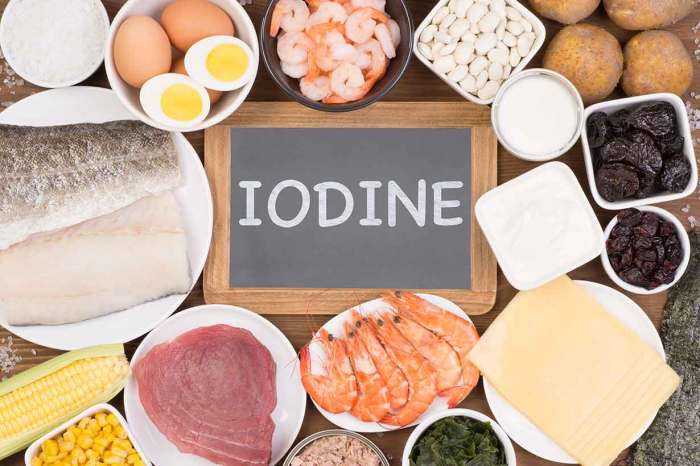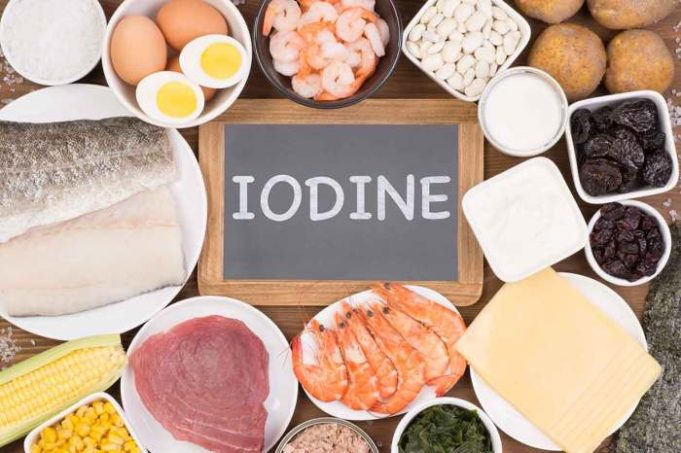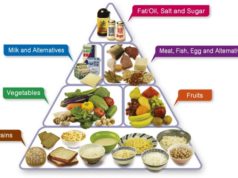How to get iodine in diet – How to get iodine in your diet is a crucial question for maintaining good health. Iodine is an essential mineral that plays a vital role in various bodily functions, particularly thyroid hormone production. This hormone is crucial for regulating metabolism, growth, and development. Iodine deficiency can lead to serious health problems, including hypothyroidism, goiter, and developmental delays, especially in children. Fortunately, incorporating iodine-rich foods into your diet can ensure you meet your daily requirements and support optimal health.
This article will delve into the importance of iodine, exploring various food sources, dietary strategies for increasing intake, and addressing common concerns about iodine deficiency. We’ll also discuss the specific needs of pregnant women and provide insights into the appropriate use of iodine supplements.
Importance of Iodine in the Diet
Iodine is an essential mineral that plays a crucial role in various bodily functions, particularly in the thyroid gland. The thyroid gland is responsible for producing hormones that regulate metabolism, growth, and development. Iodine is a key component of these hormones, making it vital for overall health and well-being.
Iodine Deficiency and Its Consequences
Iodine deficiency is a significant public health concern, affecting millions of people worldwide. It can lead to various health problems, particularly in children and pregnant women.
- Hypothyroidism: Iodine deficiency is the primary cause of hypothyroidism, a condition where the thyroid gland does not produce enough thyroid hormones. This can result in fatigue, weight gain, depression, and slowed metabolism.
- Goiter: Iodine deficiency can cause the thyroid gland to enlarge, resulting in a goiter, a visible swelling in the neck.
- Cognitive Impairment: Iodine deficiency during pregnancy can severely impact fetal brain development, leading to cognitive impairment and intellectual disabilities in children.
- Other Health Issues: Iodine deficiency can also contribute to other health problems, such as heart disease, infertility, and increased risk of certain cancers.
Iodine-Rich Foods
Fortunately, incorporating iodine-rich foods into a balanced diet can help prevent iodine deficiency and its associated health risks.
- Seafood: Seafood, particularly saltwater fish like cod, tuna, and salmon, is an excellent source of iodine.
- Dairy Products: Milk, yogurt, and cheese contain moderate amounts of iodine.
- Seaweed: Seaweed varieties like kelp, nori, and spirulina are rich in iodine.
- Eggs: Eggs are a good source of iodine, especially the yolk.
- Iodized Salt: Using iodized salt for cooking and at the table is a simple and effective way to ensure adequate iodine intake.
Food Sources of Iodine
Iodine is an essential nutrient that our bodies need to function properly. While it is found in many foods, some foods are particularly rich in iodine. Here’s a look at some of the best dietary sources of iodine.
Seafood
Seafood is the most concentrated source of iodine in the diet. Iodine is naturally present in saltwater, which is absorbed by marine organisms, including fish and shellfish.
- Fish: Cod, tuna, halibut, and salmon are excellent sources of iodine.
- Shellfish: Oysters, clams, shrimp, and crab are particularly high in iodine. For example, a 3-ounce serving of cooked oysters can provide up to 150% of the daily recommended intake of iodine.
Dairy Products
Dairy products can also contribute to your iodine intake.
- Milk: Cow’s milk, especially if fortified with iodine, can provide a decent amount of this nutrient.
- Yogurt: Yogurt made with cow’s milk can also be a good source of iodine, especially if it’s fortified.
- Cheese: Some cheeses, particularly those made from cow’s milk, can provide some iodine, but the amount varies depending on the type of cheese.
Vegetables
While not as rich in iodine as seafood or dairy, certain vegetables can contribute to your daily intake.
- Seaweed: Seaweed, like kelp and nori, is a particularly good source of iodine. A single serving of dried seaweed can provide several times the daily recommended intake of iodine.
- Spinach: Spinach is a good source of many nutrients, including iodine.
Iodized Salt
Iodized salt is a common way to increase iodine intake. Iodized salt is table salt that has been fortified with iodine. It is essential for maintaining adequate iodine levels in the diet, especially in regions where iodine deficiency is common.
Iodized salt is a cost-effective and widely available way to prevent iodine deficiency.
Dietary Strategies for Increasing Iodine Intake
Iodine is an essential mineral that plays a vital role in many bodily functions, including thyroid hormone production. Many people don’t get enough iodine in their diet, which can lead to health problems. This section will discuss various strategies for increasing iodine intake through dietary changes.
Dietary Strategies for Increasing Iodine Intake
A balanced diet rich in iodine-rich foods is essential for maintaining optimal iodine levels. Here are some practical strategies to incorporate into your daily routine:
Sample Meal Plan
Here’s a sample meal plan that incorporates iodine-rich foods:
Breakfast:
* 2 slices of whole-wheat toast with 1 tablespoon of almond butter and a sprinkle of seaweed flakes
* 1 cup of Greek yogurt with 1/2 cup of blueberries and a sprinkle of chia seeds
Lunch:
* Tuna salad sandwich on whole-wheat bread with lettuce, tomato, and avocado
* 1 cup of lentil soup
Dinner:
* Grilled salmon with roasted vegetables (broccoli, carrots, and sweet potatoes)
* 1 cup of brown rice
Snacks:
* 1/4 cup of unsalted almonds
* 1/2 cup of dried cranberries
Iodine Content in Different Food Portions
The following table highlights the iodine content in different food portions:
| Food | Serving Size | Iodine (mcg) |
|—|—|—|
| Seaweed (Nori) | 1 sheet | 160-290 |
| Cod Liver Oil | 1 tablespoon | 100-150 |
| Tuna (canned) | 3 oz | 60-80 |
| Milk (cow’s) | 1 cup | 50-60 |
| Eggs | 1 large | 20-30 |
| Yogurt (plain) | 1 cup | 15-25 |
| Potatoes | 1 medium | 10-20 |
| Spinach | 1 cup | 5-10 |
Visual Representation of a Balanced Diet Emphasizing Iodine-Rich Foods
Imagine a plate divided into three sections:
* The largest section: Fruits and vegetables, providing essential vitamins and minerals, including iodine from sources like spinach, potatoes, and strawberries.
* The second largest section: Lean protein sources, such as fish (salmon, tuna, cod), eggs, and beans, offering iodine and other vital nutrients.
* The smallest section: Whole grains, such as brown rice, quinoa, and whole-wheat bread, providing fiber and contributing to a balanced diet.
Within these sections, prioritize incorporating iodine-rich foods like seaweed, cod liver oil, and dairy products. This visual representation helps create a balanced diet that supports optimal iodine levels.
Iodine Deficiency and Supplements
Iodine deficiency is a significant public health concern, affecting millions worldwide. Understanding the factors that contribute to this deficiency, identifying those at risk, and exploring the role of supplements is crucial for maintaining optimal health.
Factors Contributing to Iodine Deficiency
Iodine deficiency can arise from various factors, including:
- Inadequate Dietary Intake: A diet lacking in iodine-rich foods can lead to deficiency. This is particularly prevalent in regions where the soil is iodine-deficient, resulting in low iodine content in locally grown produce.
- Iodine Loss During Food Processing: Some food processing methods, such as boiling or canning, can lead to iodine loss, reducing the overall iodine content in food.
- Goitrogens: Certain foods, like cruciferous vegetables (e.g., broccoli, cabbage), contain goitrogens that can interfere with iodine absorption and utilization by the thyroid gland.
- Environmental Factors: Exposure to certain environmental pollutants, such as industrial emissions, can contribute to iodine deficiency.
- Medical Conditions: Certain medical conditions, like celiac disease or chronic kidney disease, can affect iodine absorption and utilization.
- Pregnancy and Lactation: Increased iodine requirements during pregnancy and lactation can lead to deficiency if intake is not adequate.
Individuals at Higher Risk for Iodine Deficiency, How to get iodine in diet
Certain individuals are at a higher risk of iodine deficiency due to various factors:
- Pregnant and Breastfeeding Women: Increased iodine requirements during these periods can lead to deficiency if intake is not sufficient.
- Infants and Children: Rapid growth and development in infants and children necessitate adequate iodine intake for proper brain development and growth.
- Individuals with Dietary Restrictions: People following strict diets, such as veganism, may be at risk for iodine deficiency if they do not consume sufficient iodine-rich foods or supplements.
- Individuals Living in Iodine-Deficient Regions: People residing in areas where the soil is naturally iodine-deficient are more likely to experience iodine deficiency.
- Individuals with Certain Medical Conditions: As mentioned earlier, certain medical conditions can affect iodine absorption and utilization, increasing the risk of deficiency.
Iodine Supplements and Their Appropriate Usage
Iodine supplements can be a valuable tool for addressing iodine deficiency, particularly for individuals at higher risk.
It is crucial to consult a healthcare professional before taking any supplements, including iodine supplements, to determine the appropriate dosage and ensure it aligns with individual needs.
- Types of Iodine Supplements: Common iodine supplements include potassium iodide, sodium iodide, and kelp (a seaweed source of iodine). The dosage and form of the supplement may vary depending on individual requirements.
- Recommended Daily Intake: The recommended daily intake of iodine varies based on age, gender, and pregnancy status. The recommended daily intake for adults is 150 mcg, while pregnant women require 220 mcg and breastfeeding women need 290 mcg.
- Potential Side Effects: While iodine supplements are generally safe when taken at recommended doses, excessive intake can lead to side effects such as thyroid problems, skin rashes, and gastrointestinal issues. It is crucial to adhere to recommended dosages and consult a healthcare professional if any adverse effects occur.
Iodine and Pregnancy
Iodine is a crucial nutrient for both the mother and the developing fetus during pregnancy. Adequate iodine intake is essential for the healthy growth and development of the baby’s brain, nervous system, and thyroid gland.
Iodine’s Role in Fetal Development
Iodine is essential for the production of thyroid hormones, which play a vital role in fetal growth and development. These hormones regulate many essential functions, including brain development, heart function, and bone growth. During pregnancy, the mother’s thyroid gland produces more thyroid hormones to meet the needs of the growing fetus. If the mother’s iodine intake is insufficient, her thyroid gland may not be able to produce enough hormones, leading to iodine deficiency.
Risks of Iodine Deficiency During Pregnancy
Iodine deficiency during pregnancy can have serious consequences for both the mother and the baby.
- For the mother: Iodine deficiency can lead to hypothyroidism, a condition characterized by an underactive thyroid gland. This can cause fatigue, weight gain, depression, and other symptoms.
- For the baby: Iodine deficiency can lead to a range of problems, including:
- Congenital hypothyroidism: This is a condition where the baby is born with an underactive thyroid gland. It can lead to developmental delays, intellectual disability, and other problems.
- Stillbirth: In severe cases, iodine deficiency can increase the risk of stillbirth.
- Premature birth: Iodine deficiency can also increase the risk of premature birth.
- Neurodevelopmental problems: Iodine deficiency can lead to problems with cognitive function, attention, and behavior.
Recommended Iodine Intake During Pregnancy
The recommended daily intake of iodine for pregnant women is 220 micrograms (mcg). This can be achieved through a balanced diet that includes iodine-rich foods. If you are concerned about your iodine intake, talk to your doctor about taking a prenatal vitamin that contains iodine.
Wrap-Up

By understanding the importance of iodine and implementing the strategies Artikeld in this article, you can ensure you’re getting enough of this essential mineral. From choosing iodine-rich foods to considering supplementation when necessary, taking proactive steps towards optimal iodine intake can have a significant impact on your overall well-being. Remember, a balanced diet and informed choices are key to maintaining a healthy and vibrant life.
Common Queries: How To Get Iodine In Diet
What are the signs of iodine deficiency?
Signs of iodine deficiency can include fatigue, weight gain, constipation, dry skin, and depression. In severe cases, it can lead to goiter, a swelling in the neck due to an enlarged thyroid gland.
Can I get too much iodine?
Yes, consuming excessive amounts of iodine can be harmful. The recommended daily intake varies depending on age and health status. It’s important to consult with a healthcare professional if you have concerns about your iodine intake.
Are there any risks associated with iodine supplements?
While iodine supplements can be beneficial for some individuals, it’s essential to use them under the guidance of a healthcare professional. Excessive intake can lead to side effects such as thyroid problems, skin rashes, and gastrointestinal issues.
What are some other good sources of iodine besides seafood?
Other good sources of iodine include dairy products, eggs, seaweed, and iodized salt. It’s important to note that the iodine content in these foods can vary depending on factors such as farming practices and soil composition.
Getting enough iodine in your diet is crucial for thyroid health. You can find it in seafood, dairy products, and iodized salt. If you’re following a specific dietary plan, like the if diet , be sure to check if it meets your iodine needs.
If you’re unsure, consulting a healthcare professional is always a good idea.
Getting enough iodine in your diet is important for thyroid health. Seaweed, dairy products, and iodized salt are good sources. You can also increase your intake of fiber-rich foods, which can help with digestion and overall health. To learn more about incorporating fiber into your diet, check out this helpful article on how to get more fibre in your diet.
Once you’ve boosted your fiber intake, remember to continue focusing on iodine-rich foods for a balanced and healthy diet.
Seaweed, dairy products, and iodized salt are all good sources of iodine. While focusing on your iodine intake, it’s also important to consider other aspects of your diet, like whether or not diet soda is a good choice for you.
If you have diabetes, you might want to check out this article about is diet soda bad for diabetics before making a decision. Once you’ve figured out your diet soda stance, you can get back to ensuring you’re getting enough iodine.
























